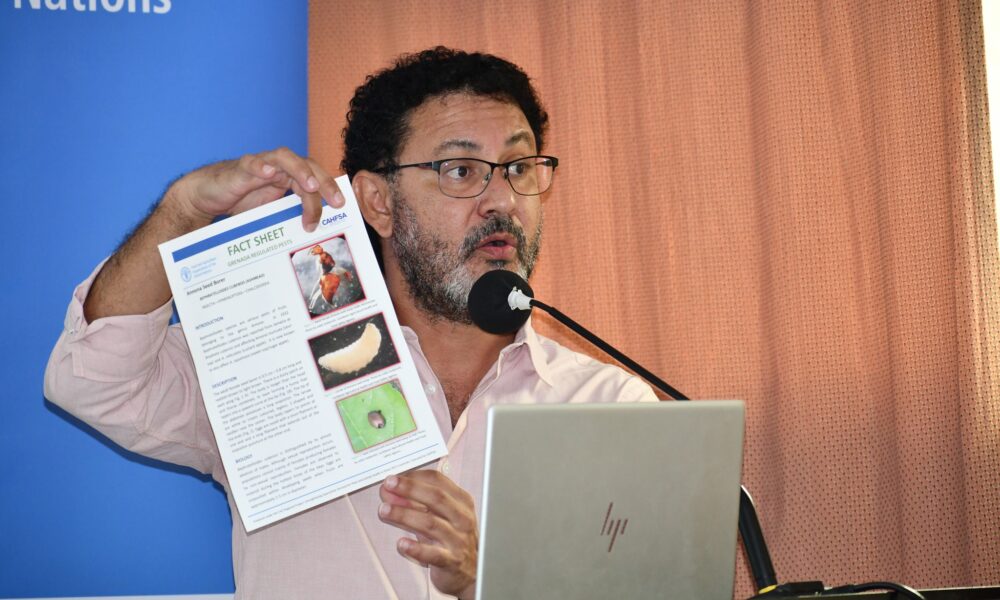Grenada takes firm action to safeguard and develop its USD 2.6 million soursop industry
The island aims to increase capacity of the industry and explore new export markets
Launched on April 18, 2024, a three-year project entitled, “Enhancing Sanitary and Phytosanitary Measures (SPS) capacity and market access for Grenadian soursop exports” aims to help the country enhance its industry traceability and surveillance systems, as well as the soursop industry’s ability to manage future pest risks and investigate potential diversification into new markets. The project will be carried out by the Food and Agriculture Organization of the United Nations (FAO) and is funded in collaboration with the Ministry of Agriculture & Lands, Forestry, Marine Resources & Cooperatives in Grenada and The Standards and Trade Development Facility (STDF) of the World Trade Organization based in Geneva, Switzerland.
With a projected annual value of US 2.6 million, the soursop industry in Grenada is thriving and robust with the United States of America (USA) as its main export market. The lack of two pests—the fruit borer and the seed borer allows the island to have advantageous access to this market. Additionally, due to the large number of immigrant communities in the USA, soursop has become more popular over the years.
Equally important is an estimated 2,600 farmers, most of them being small-scale farmers, who rely on soursop for their livelihood with farming as their primary source of income. Due to the industry’s significant earnings and potential for further expansion, increasing soursop production and export has been given priority in Grenada’s National Sustainable Development Plan 2020–2035. This has led to the collaboration between the Food and Agriculture Organization of the United Nations (FAO) and the Ministry of Agriculture and Lands, Fisheries, and Cooperatives.
The launch of this project was attended by 30 participants including officials from the Ministry of Agriculture as well as other stakeholders. During the workshop, several key project topics were discussed including developing a holistic surveillance programme and emergency response, strengthening the capacities of government institutions on monitoring, detection, response, certification and traceability systems, and strengthening the Integrated Pest Management (IPM) for famers, private sector and extension services. The workshop also focused on boosting the soursop industry to manage future risks and expand market access.
In offering remarks at the workshop, Dr Renata Clarke, FAO’s Sub-regional Coordinator stated, “The Standards and Trade Development Facility’s financial contribution is more than matched by the government’s own contribution. I have been hearing about the programs of the government to support extension and outreach to farmers so that they can implement good practices. It is also matched by FAO’s past and ongoing support to the soursop value chain. So, all the partners have skin in the game. In closing, I am counting on the government and on you national stakeholders to make this an exemplary project. Many eyes will be on you. Your partners STDF and FAO will be supporting you throughout and I look forward to sharing the satisfaction for a job well done at the end”.
Meanwhile, Catalina Pulido, STDF’s Economic Affairs Officer highlighted that this is the first project that her organization will finance in Grenada. She indicated, “Lessons learned are expected to be disseminated within the Caribbean and other regions and applied to other value chains of interest for different commodities in Small Island Developing States. This inception workshop will be key to validate with all relevant stakeholders, the project’s logical framework which states the project’s main goal, expected outcomes and outputs, as well as indicators of success”.
During the workshop, Vermaran Extavour, Value Chain Expert and Project Coordinator spoke on FAO’s gender equality policy aimed at achieving equality as part of the elimination of hunger and poverty. She stated, “Our work includes value chain development for soursop and recorded 80 percent men in production, and 80 percent women in processing, while youth also play role in harvesting and production”.
Thaddeaus Peters, Pest Management Officer with the Ministry of Agriculture provided a comprehensive insight into pest management for the soursop industry in Grenada, while Juliet Goldstein of The Caribbean Agricultural Health and Food Safety Agency (CAFSA) provided an overview of the organization’s pest intervention initiatives in Grenada.
Melvin Medina Navarro, FAO’s Plant Production and Protection Officer who is leading the workshop gave an in-depth overview of the project. He indicated, “This project is extremely important for Grenada to improve farmers’ livelihoods maintaining access to export market in the USA. The project will work to strength national capacities to keep the country free of quarantine pest and engage with private sector to increase quality standards.
Navarro added that the workshop was important and timely as the organization celebrates and acknowledges The International Day of Plant Health on May 12 which calls on everyone to raise awareness and take action to keep our plants healthy and ensure food safety and safe trade for sustainable economies and livelihoods. (PR)

